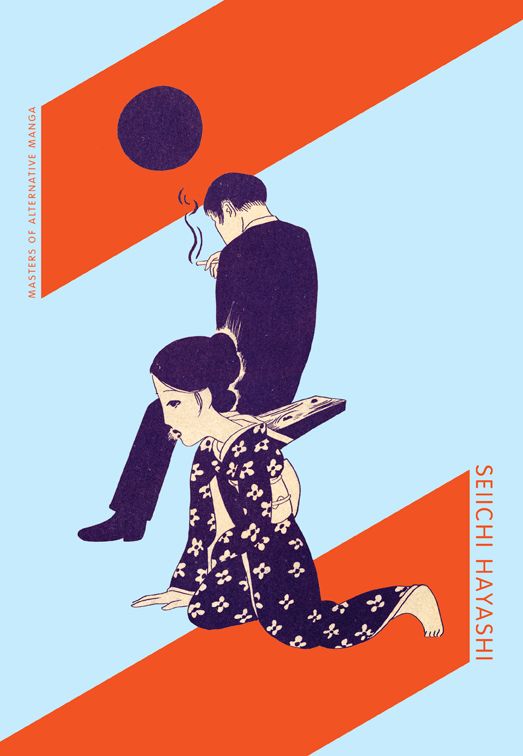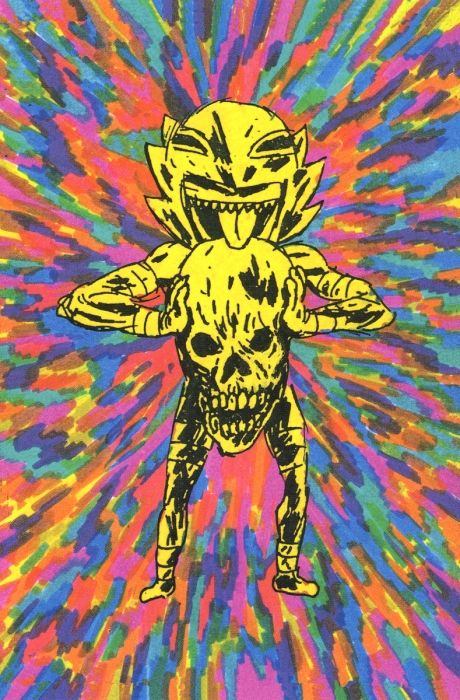The big news (for me at least) of the past week was Dan Nadel's announcement that he has decided to close up shop on PictureBox, his publishing empire. While I completely understand his desire to focus his energies on other things it's sad news nevertheless. PictureBox was one of the most interesting and daring comics publishers out there and the books they released helped change the conversation about what comics should be.
Thankfully, Nadel is going out with a bang in the form of a 50 percent-off sale through Jan. 2. PictureBox published so many excellent books by so many talented cartoonists – Lauren Weinstein, Mat Brinkman, Jonny Negron, Frank Santoro, Ben Jones, etc. – that making a few essential recommendations is a tough task to put it mildly. Still, if you're looking to take advantage of the sale, and aren't sure what to buy, here are some books I enjoyed a great deal and think you might too.
1. Gold Pollen and Other Stories by Seiichi Hayashi. One of the sadder tragedies of PictureBox's closing is it comes just as critic and scholar Ryan Holmberg's two new lines – Ten Cent Manga and Masters of Alternative Manga – were just getting started. I greatly enjoyed the two books in the Ten Cent line (The Mysterious Underground Men by Osamu Tezuka and Last of the Mohicans by Shigeru Sugiura) but it was Gold Pollen that really floored me. This collection of highly symbolic short stories (one uncompleted) present some really daring, exciting work by Hayashi (author of Red Colored Elegy), particularly the elegant, minimalist Red Dragonfly. That, combined with Holmberg's insightful, educational essay make this my favorite book of 2013 thus far. The good news is that apparently Holmberg has found a publisher interested in picking up the Ten Cent Manga line. No word yet if the Alternative Manga line will find a benefactor, but let's keep our fingers crossed.
2. Gary Panter or Cola Madness by Gary Panter. Having problems figuring out why everyone goes so agog over Gary Panter? Try one of these books. The former is an oversize, two-volume collection monograph collecting the artist's paintings, drawings, comics and other work. The latter is Panter's crazed 1983 graphic novel. Both make for excellent introductions into Panter's punk-infused world of pop culture detritus. I would probably recommend Cola first, but it's tough to overlook what a great deal that monograph during this sale.
3. Garden by Yuichi Yokoyama. When I first came across the work of Yuichi Yokoyama in the pages of The Comics Journal and that one issue of the anthology Bete Noire, I thought, "This guy seems so amazing but there's no publisher in the U.S. that would dare to release his work." All credit then to Nadel for investing so strongly in Yokoyama and realizing there was an audience for his work on these shores. All of Yokoyama's books are fantastic and worth owning, but if you haven't tried any of his work yet, Garden, which concerns nothing more than a large group of people exploring a futuristic garden, might be the best entry point.
4. Maggots by Brian Chippendale. As with Yokoyama's work, I had heard about Chippendale and the Fort Thunder crowd in hushed tones here and there, but found tracking down these books – apart from the few the late, lamented Highwater Books released – difficult to come across. One especially hallowed tome was Chippendale's Maggots, a near stream-of-consciousness comic done over the pages of a Japanese book catalog. It's a dark, dense work that is more interested with having characters interact and explore than create a conventional narrative (you can't really even read it in a traditional left to right fashion), but it's a rewarding, absorbing read all the same.
5. Infomaniacs by Matthew Thurber. PictureBox is going out on a high note with its final release, Thurber's follow-up to his 1-800-MICE. Like MICE, Infomaniacs is a surreal, absurd story involving a large cast of bizarre characters. This time around, however, the satire is a lot more focused, with Thurber's eye sharply on the modern Internet age, and how constantly staying plugged in all the time has affected our culture and ability to handle life beyond the computer. Of course, this all involves horses that work for the government, assassin drones, vegetables that let you access the Internet "organically" and a comic convention held on top of a mountain. I short, this is a deliriously silly affair, which doesn't for an instant make it any less trenchant, observant or, for that matter, genuinely funny.
6. School Spirits by Anya Davison. In the "Circe" chapter Ulysses, Joyce presents the action taking place as a staged play. There's a lot of debate in literary circles whether the action Joyce presents is – bizarre as it appears to be – is actually happening or is merely the fevered, hallucinatory, subconscious ramblings of Stephen Dedalus and Leopold Bloom. It's a complete breakdown between the worlds of fantasy and reality. So it is likewise with School Spirits, a frenzied, constantly shifting comic that at first seems to chronicle a day in the life of high school student and metal head Oola, but can't stay in one place long enough to stick to the story too long. Like an ADD-suffering child that's been off it's Ritalin too long, School Spirits constantly segues to the lives of Oona's friends and teachers, or to her rather bizarre daydreams (one lengthy sequence involving her imagining what she'd like to do to the handsome boy one desk over summons just about every sort of scenario imaginable, so long as they're not actually erotic). Or are all these oddball sequences and asides actually happening in the same space as Oona's high school classes? Honestly it's tough to tell at times.
I don't mean to make this book sound like some dull, literary exercise; it's totally not. It's a surreal, funny, totally original comic that sit still or give in to pressure for a more standard, familiar type of story, all to its benefit. I'm thankful to Dan and PictureBox for making the effort to get it in front of my (and other folks') eyes.



